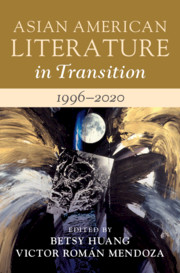Book contents
- Asian American Literature in Transition, 1996–2020
- Asian American Literature in Transition
- Asian American Literature in Transition, 1996–2020
- Copyright page
- Contents
- Illustrations
- Contributors
- Series Preface
- Acknowledgements
- Introduction
- Part I Neoimperialisms, Neoliberalisms, Necropolitics
- Part II Intersections, Intimacies
- Part III Genres, Modalities
- Part IV Movements, Speculations
- Chapter 13 Asian American Literary Studies and the Challenge of Utopia
- Chapter 14 What Is Asian America to Asians?
- Chapter 15 Mixed-Race Asian American Literature at the Turn into the Twenty-First Century
- Chapter 16 Global Asias
- Chapter 17 Finale; Or, Alternative Originaries
- Bibliography
- Index
Chapter 17 - Finale; Or, Alternative Originaries
Imagining an Asian American Superhero of North Korean Origin
from Part IV - Movements, Speculations
Published online by Cambridge University Press: 27 May 2021
- Asian American Literature in Transition, 1996–2020
- Asian American Literature in Transition
- Asian American Literature in Transition, 1996–2020
- Copyright page
- Contents
- Illustrations
- Contributors
- Series Preface
- Acknowledgements
- Introduction
- Part I Neoimperialisms, Neoliberalisms, Necropolitics
- Part II Intersections, Intimacies
- Part III Genres, Modalities
- Part IV Movements, Speculations
- Chapter 13 Asian American Literary Studies and the Challenge of Utopia
- Chapter 14 What Is Asian America to Asians?
- Chapter 15 Mixed-Race Asian American Literature at the Turn into the Twenty-First Century
- Chapter 16 Global Asias
- Chapter 17 Finale; Or, Alternative Originaries
- Bibliography
- Index
Summary
North Korea and posthuman superheroes rarely share discursive space. One reason: North Korea - the Democratic People’s Republic of Korea (DPRK) - is often imagined as a pre-posthuman Cold War relic. Another reason: it may seem wrong, even blasphemous, to discuss posthumanism and superheroes vis-à-vis a regime that systematically violates human rights. While mindful of such realities, I believe posthumanism can refresh overly rehearsed scripts surrounding the DPRK. The vocabulary of posthumanism (e.g. Donna Haraway’s “cyborg”) and posthuman characters from science fiction (e.g. the instantly legible superhero Spider-Man as well as the less legible Korean American Spider Lim in Richard Powers’s novel Plowing the Dark) can provide new approaches to North Korea’s “otherness” and “post”-DPRK refugees. Moreover, superheroic icons and posthumanism can address a new American art of DPRK origin such as the artwork of Song Byeok and Sun Mu. Finally, posthumanism and superheroes must narrate Korea’s future beyond trauma, war, and division. It is time for us to uproot, fruitfully, kimilsungia and kimjongilia from their rotting namesakes. Let them grow wild in the Korean Demilitarized Zone (DMZ). How might these organisms mutate? Dear Korean and Korean American artists and writers: let us now respond.
- Type
- Chapter
- Information
- Asian American Literature in Transition, 1996–2020 , pp. 331 - 345Publisher: Cambridge University PressPrint publication year: 2021

